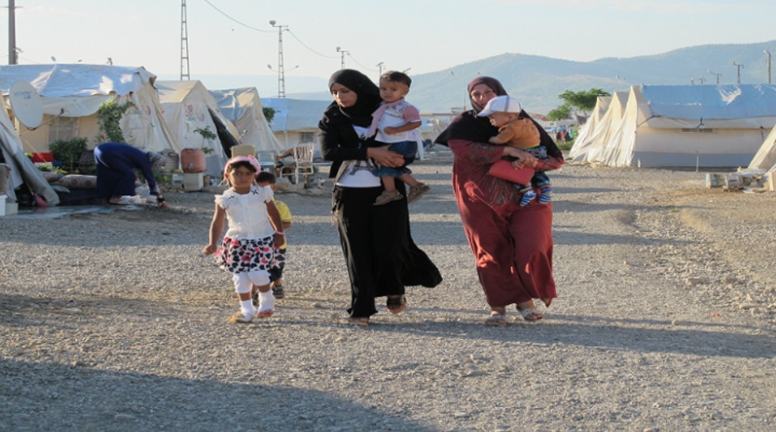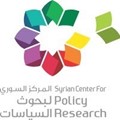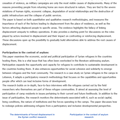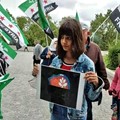Children of Syrian detainees are deprived of psychological support in Turkey
Thousands of former detainees in the prisons of the Syrian regime sought refuge in Turkey, many of them came with their children, and some of them married inside Turkish territory and became mothers. These mothers found psychological support centers, but their children were not covered by this psychological care that is provided to their mothers, especially since they suffered from the psychological pain that They suffered from it during their detention and the pressures and problems that accompanied them after their release and their return to mixing with society again.
Many of these children were left alone with their mothers, and added to the role of the mother, who is basically suffering from the effects of detention, the role of the psychiatrist and breadwinner, who must raise her son and prepare him psychologically so that he can coexist with his surroundings, and integrate into Turkish society, which is considered new to him, especially since He lived in a different environment, and if he was detained with his mother, he would have gone through three different living environments.
Noura “S” is a former detainee in the prisons of the Syrian regime. She lives in the city of Antakya in southern Turkey. She is a mother of three children. Her husband left her because of her arrest. Upon her release from detention, she sought refuge in Turkey with her family. She told Al-Gharbal magazine, “I went to several NGOs concerned with psychological support, and all of them She was concerned with the mental health of detainees, but she did not have any programs dedicated to their children, and some of these associations refused to enter children over 12 years old, because they were able to take care of themselves while the mother was in the center of the organization.
Noura adds, “I am constantly worried about the behavior of my 13-year-old son, who lived with his grandmother during my detention for nearly a year, and he used to hear every day about my suffering. Whoever makes fights in his school and with his peers, he does not hear my words, does only what he wants to do, and repeatedly avoids performing his homework, until I was summoned several times by his school principal.”
In her interview with Al-Gharbal magazine, Noura confirms that she went to Turkish associations to include him in psychological support programs for children, but that association apologized, she said, and told her that there were no programs for Syrian children, but welcomed her to join one of those programs supervised by psychologists if she wanted. .
Um Yusef, a former detainee residing in the city of Şanlıurfa, told Al-Gharbal magazine, “I have two children, the eldest of whom is sad. He does not want to study or play with the children, he wants to stay with me permanently or play mobile games, and when his father comes back from work in the evening, he treats him like strangers and rarely comes into contact with him, although the father tried to get close to him.”
Umm Youssef added, “My husband asked me to ask the management of the center where I receive psychological support sessions if it is possible to enroll him in psychological support activities, but the management was unable to find that there are no programs for children, but the center officials did not mind bringing him with me, and when I brought him there was not much of the children, and saw that there was no interest in him, so he refused to come with me to the center.”
There are no official statistics on the number of children from the children of former detainees in Syria, but Umm Youssef says that there are 40 women receiving psychological support in Urfa, who have more than 100 children, and the same number of them in Hatay, according to Noura. Leaving this category of children without psychological care will greatly affect their future, their educational attainment, and their interaction in the societies in which they live, and these psychological scars will leave in their souls a stigma that will remain with them for life, according to the psychological and educational specialist and counselor with psychological and social support Razan Mustafa.
Mustafa believes that caring for the children of former detainees is no less important than caring for their mothers, especially since many of them may have been arrested with them, or some of them were deprived of tenderness during their time in detention, and they may have been neglected or abused during that period, and there was no Those who take care of them or care for them, and others have been left without fathers, due to the separation between the spouses as a result of the wife’s arrest.”
Jurist Omar Bakour explains to Al-Gharbal magazine, “It is the right of any Syrian on Turkish soil to benefit from all health and psychological services, and this is guaranteed according to human rights laws and the “Temporary Protection Law” to which Syrians in Turkey are subject, but there is a shortcoming of organizations working on Turkish lands, and these phenomena are common in the southern Turkish states.
According to the Syrian Network for Human Rights, 9,774 women are still under arrest and enforced disappearance, 8,096 of whom are missing in the regime's prisons and detention centers. A number of female detainees lost their lives under torture.
According to the Turkish Refugee Association, the number of Syrian refugees reached about 3,701,584 refugees registered in the restrictions of the Immigration Department and the Foreigners Division, where Syrian men constituted 52.8 percent of the total number of Syrians, while the proportion of women amounted to 46.2 percent, and the statistics showed that the number of Syrians without The age of ten is 1,720,000, while the number of young people is about 755,790, their ages ranged between 15 and 24 years.
In her interview with Al-Gharbal magazine, Noura confirms that she went to Turkish associations in order to include him in psychological support programs for children, but that association apologized, she said, and told her that there are no programs
Depriving this category of children of psychological support is inconsistent with Article 25 of the Universal Declaration of Human Rights, which said that “every person has the right to a standard of living sufficient to ensure the health and well-being of himself and his family, especially in terms of food, clothing, housing, medical care and necessary social services.” And he has the right to what is secured for families in cases of unemployment, sickness, disability, widowhood, old age, or other circumstances beyond his control and which make him lose his means of subsistence.
This material was produced with the support of Journalists for Human Rights JHR





